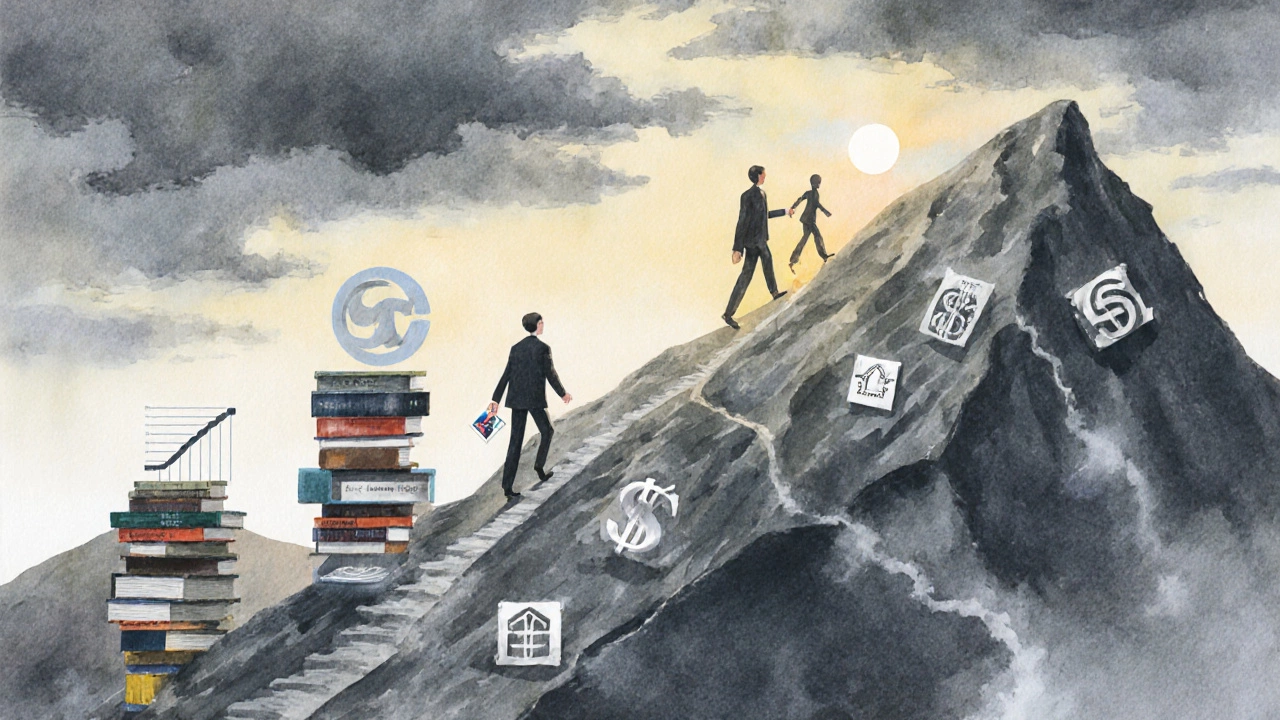MBA Readiness Calculator
How Ready Are You for MBA Stress?
Answer these questions to understand your potential workload stress level
Your MBA Readiness Assessment
Based on your answers, here's what to expect
Your stress level assessment
This reflects how your personal circumstances may impact your MBA experiencePeople ask if an MBA is hard like it’s a yes-or-no exam. It’s not. It’s more like asking if running a marathon is hard. The answer depends on who’s running, what kind of terrain they’re on, and why they signed up in the first place.
It’s not about intelligence-it’s about time
A lot of people think an MBA is hard because it’s full of complex math or fancy theories. That’s not the real issue. Most MBA programs don’t test your IQ. They test your schedule. You’re not just studying-you’re managing a full-time job, a social life, maybe kids, and a side project all at once. A typical week might look like this: Monday to Friday, 8 a.m. to 6 p.m. in class or at an internship. Evenings are for group projects. Weekends are for catching up on readings or prepping for presentations. Sleep? That becomes a luxury.
One student at Melbourne Business School told me she pulled three all-nighters in two weeks just to finish a case study with her team. She wasn’t struggling with the material-she was struggling to find time to breathe. That’s the real challenge: managing energy, not just knowledge.
The workload isn’t what you expect
You think you’ll be reading textbooks. You’re not. You’re reading case studies-real business situations from companies like Amazon, Tesla, or local startups. Each case is 10-20 pages long. You’re expected to analyze it, identify the problem, propose a solution, and defend it in class. One class might have three cases. That’s 60 pages of dense, real-world business drama in one day.
Group projects are another beast. You’re stuck with five people you barely know, each with different work styles. One person is a perfectionist. Another hasn’t opened the file since Day 1. You end up doing 70% of the work just to keep the grade from collapsing. It’s not unfair-it’s normal. And it’s designed that way. Real business doesn’t care if your teammate slacked off. You still have to deliver.
Stress comes from pressure, not complexity
The coursework isn’t technically hard. You don’t need to be a math genius to understand NPV calculations or break-even analysis. Most MBA programs teach these concepts in a way that’s practical, not academic. The stress comes from the stakes. Your grade affects your internship offer. Your internship offer affects your job after graduation. And your job affects your salary, your location, your future.
At the University of Sydney’s MBA program, students say the most stressful moment isn’t finals-it’s career fair week. You spend weeks prepping your resume, practicing your pitch, and researching companies. Then you walk into a room with 50 recruiters and realize half of them aren’t hiring MBAs this year. The other half already filled their spots. That kind of pressure doesn’t show up in syllabi. But it’s real.

Some people find it easy. Others break.
There’s no single answer to whether an MBA is hard because it hits different people in different ways.
- If you’ve worked for five years in marketing and now you’re learning finance, it’s a stretch-but you’re used to learning on the job.
- If you’re fresh out of undergrad and never held a real job, the pace will feel like a sprint with no finish line.
- If you’re balancing a family, the guilt of missing school events or bedtime stories can be heavier than any exam.
One graduate from Adelaide’s MBA program told me he dropped out after six months. Not because he failed. He passed every class. But he realized he hated the corporate path he was being pushed toward. The program didn’t break him-he broke himself by chasing a goal he didn’t truly want.
It’s worth it if you know why you’re doing it
Here’s the truth: an MBA isn’t hard because it’s technical. It’s hard because it forces you to answer big questions: What do I want? Who do I want to be? Is this path mine, or is it what my parents, my friends, or LinkedIn told me to do?
Those who survive-and thrive-aren’t the smartest. They’re the ones who showed up even when they were tired. Who said no to parties to finish a project. Who asked for help when they were drowning. Who realized mid-program that they wanted to start a business, not join a bank-and changed their track.
At the end of the day, the MBA doesn’t test your brain. It tests your clarity. Your resilience. Your willingness to grow-even when it’s messy.

What makes an MBA easier?
If you’re thinking about applying, here’s what actually helps:
- Work experience first. Programs like INSEAD or Melbourne Business School prefer applicants with 3-5 years of real work. You’ll understand the cases better. You’ll contribute more in class. You’ll connect the dots faster.
- Choose the right program. Full-time, part-time, online-each has a different rhythm. If you’re working, a part-time MBA at UTS or Monash might be less brutal than a full-time one.
- Build your support system. Talk to current students. Join alumni groups. Find a mentor. You don’t have to do this alone.
- Know your exit plan. What do you want after graduation? A promotion? A career switch? Starting a business? Write it down. Keep it visible. When things get rough, it’ll remind you why you started.
It’s not about being perfect-it’s about being persistent
There’s no magic formula to make an MBA easy. But there is a simple rule: show up. Even when you’re exhausted. Even when you doubt yourself. Even when the group member who promised to do their part ghosted you again.
The MBA doesn’t reward the smartest. It rewards the ones who keep going.
